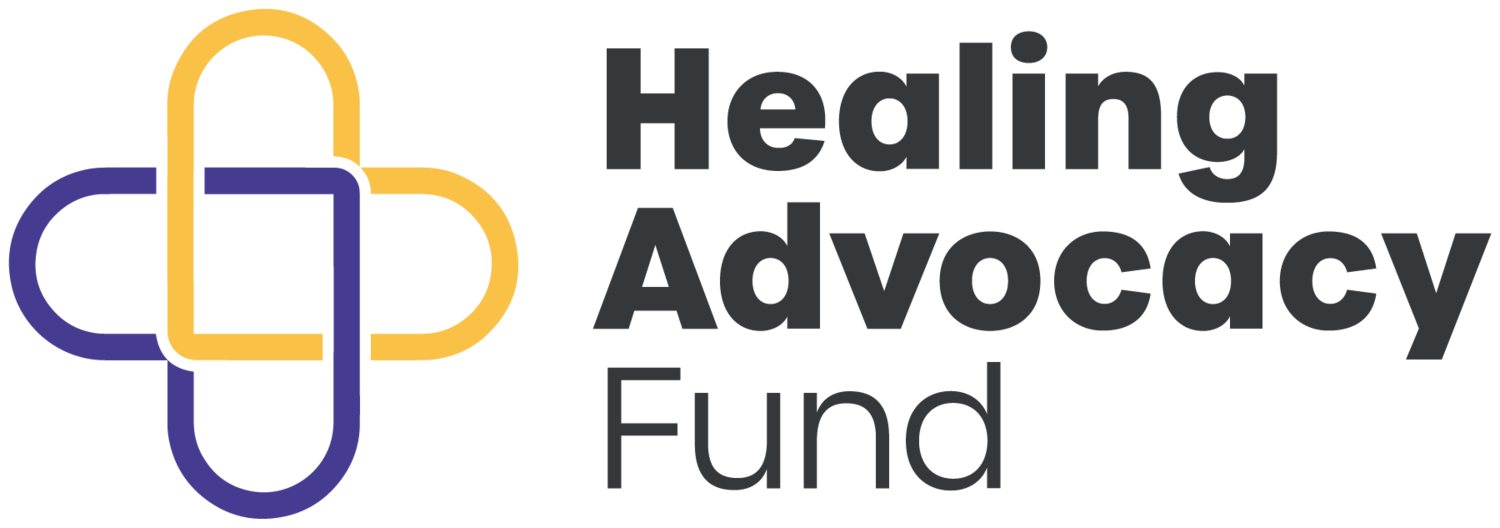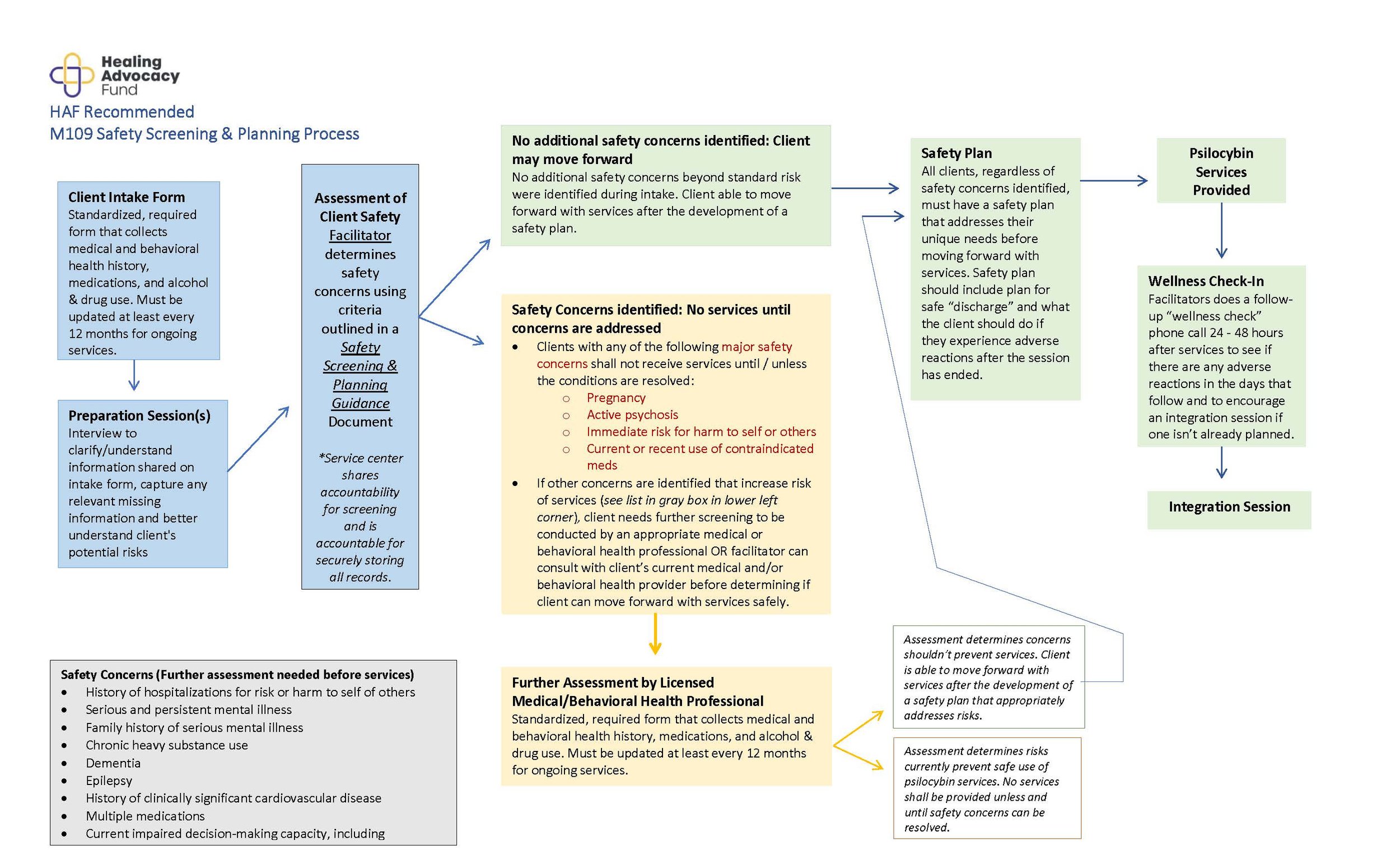HAF Draft Rule Comments: Safety & Training
Dear OHA Psilocybin Program Leadership and the Oregon Psilocybin Advisory Board,
The Healing Advocacy Fund (HAF) is a nonprofit organization dedicated to supporting the thoughtful and practical development, implementation, and education of the nation’s first regulated psilocybin therapy program. HAF was established after Measure 109 was passed to support the development and implementation of a program consistent with the voters' intent. I appreciate how much time you are dedicating to this same goal.
Please accept the enclosed comments on the draft screening and safety rules and the training program rules and process on behalf of the HAF.
The first document is a flow chart we created as an attempt to create a visual of the recommendations recently made by the Facilitator Training subcommittee, with additional recommendations to further strengthen the process. This flowchart shows the screening process from intake through service provision, including the process if safety concerns are identified.
HAF’s recommended additions to this process are:
Clarify service center and facilitator accountabilities in the process
Add epilepsy, family history of severe mental illness, and clinically significant history of heart disease to the list of safety concerns
Require standard elements in the safety plan, regardless of client risk level
Require the facilitator to conduct a “wellness check” within 48 hours after the administration session to identify if additional medical or therapeutic services are needed.
The second attached document comments on the training program rules and process. The recommendations are tracked in the draft rules and we provided an overview document that outlines the existing rule language, guidance, and rationale for our advice. I believe you will find these recommendations to be consistent with the work of your committees to establish rigorous standards for training, safety, and access.
Summary of Proposed Training Rule Amendments - April 2022
Current draft rule: Training program approval has a term of five years from the date of initial approval
Recommendation: Training program approval is initially for two years, with reapproval every three years.
Explanation: The training of Facilitators is a brand-new industry in a fast-changing field which is continually being informed by new research findings from around the globe. Being responsive to these teachings will be important, which shorter approval / reapproval periods encourages.
———
Current draft rule: Does not address whether or not practicum (or a portion of it) must be conducted in-person
Recommendation: Practicums should be in-person.
Explanation: Many training schools have experienced challenges during the pandemic of not being able to discern in remote environments whether and to what extent their students are ready to practice. Many experts believe that practicum is the most important part of training. If you are not able to see your students in action, if they are mostly muted and off camera and not interacting in front of you, that would make it challenging to evaluate their competencies. Psilocybin facilitation is an in-person skill best evaluated in-person. While we recognize that public health emergencies are a foreseeable possibility, we believe that for reasons of program safety and efficacy, student graduations should be paused during such emergencies until the students are able to receive the myriad benefits of in-person practicum training and supervision. Data with respect to the training of clinicians across disciplines makes clear that in-person practicums are critical and should not be sacrificed.
———
Current draft rule: n/a
Recommendation: No less than fifty percent (50%) of the alternative practicum training must consist of activities in which students directly interact with clients or client-counterparts who are undergoing preparatory, administration or integration sessions, as opposed to passively observing those sessions engaged in by others..
Explanation: It is impossible to adequately observe and assess a student’s knowledge, skills and temperament absent the student engaging in interactive activities.
Current draft rule: Does not require sign-off from practicum site supervisor prior to a student who has graduated from a training program to sit for the state Facilitator licensing exam.
———
Recommendation: Add a practicum requirement that: “As a condition of eligibility to take the Facilitator licensing exam, a student must have a practicum site supervisor or a staff member from the alternative practicum training activity provide a written endorsement that the student is prepared to practice as a Facilitator once licensed.”
Explanation: It is common in psychotherapy and other fields to have the student’s practicum supervisor endorse the student for licensure to practice. This requirement helps safeguard against students who are book smart but deficient as a matter of hands-on client skills from being able to practice in the field simply by being able to pass written tests administered by the training school and / or state licensing authority. There needs to be a “good fit” assessment and endorsement done by one or more persons who have witnessed the student’s abilities in a clinical or quasi-clinical setting.
———
Current draft rule: Allows for training modules regarding administration, integration, and practicum to be waived
Recommendation: For accelerated hours, add three required modules that cannot be skipped: “Administration,” “Integration”, and the practicum.
Explanation: Regardless of past experience, administration and integration are vitally important skills that we ensure to make sure each student has gone through. The practicum is important so we have a supervisor who can see the student in the field and endorse them. While many people do have a shared understanding of these three arenas, the Oregon model is unique, and we feel strongly that as we professionalize the space, these core areas cannot be skipped regardless of prior experience, training, or certification.
———
Current draft rule: n/a
Recommendation: Add a requirement to the program completion rules: “Training programs shall have one core staff member of the program, such as an instructor or cohort leader, personally endorse the student as provisionally qualified to take the state licensing exam, assuming a successful practicum endorsement. This Program endorsement is separate from the Practicum Site endorsement which is also required for Facilitator licensure.”
Explanation: The reasoning is similar to that for the recommendation for a practicum supervisor endorsement and will force program staff to observe their students’ demeanors, habits and class-interactions to help insure that students who can competently memorize and regurgitate information but who may lack the ability to listen to, communicate, cooperate and collaborate with, and be respectful of others are not graduated from training programs based solely on test scores.
———
If you have any questions about the comments, please let me know. I am pleased to engage in more conversations about our recommendations and why we believe these are important for the safety and efficacy of the program overall.
Sincerely,
Sam Chapman
Executive Director
Healing Advocacy Fund
———
Last but not least - Are you interested in launching a training program for psilocybin facilitators? If so, we want to meet you!
HAF is exploring ways to empower folks who are in the process of starting their own training programs. If you have not yet spoken to myself or Alice Liu about your training program, please fill out this form to learn more.

